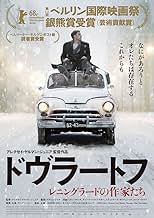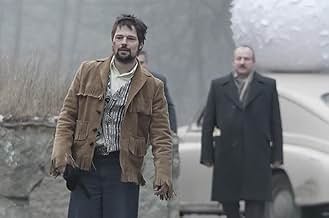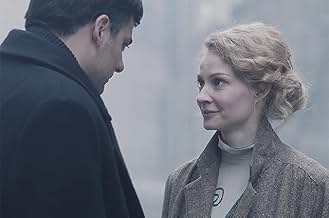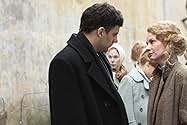Dovlatov
- 2018
- Tous publics
- 2h 6min
NOTE IMDb
6,4/10
2,3 k
MA NOTE
Ajouter une intrigue dans votre langueThe film actions unfold in 1971, telling about the four days of life of famous writer Sergei Dovlatov. The film raises the eternal issue of the Russian and European culture - the issue of mo... Tout lireThe film actions unfold in 1971, telling about the four days of life of famous writer Sergei Dovlatov. The film raises the eternal issue of the Russian and European culture - the issue of moral choice.The film actions unfold in 1971, telling about the four days of life of famous writer Sergei Dovlatov. The film raises the eternal issue of the Russian and European culture - the issue of moral choice.
- Réalisation
- Scénario
- Casting principal
- Récompenses
- 5 victoires et 11 nominations au total
Danila Kozlovsky
- David
- (as Danila Kozlovskiy)
Tamar Hovhannisyan
- Nora Dovlatova - Sergei Dovlatov mother
- (as Tamara Oganesyan)
Anna Yekaterininskaya
- Deputy director of the plant
- (as Anna Ekaterininskaya)
Sergei Tolstov
- Factory Newspaper Editor
- (as Sergey Tolstov)
Maria Järvenhelmi
- Finnish tourist
- (as Mari Yarvinkhelmi)
Nikolai Shatokhin
- Dovlatov's friend
- (as Nikolay Shatokhin)
Avis à la une
In Soviet times, no one needed talent. Mediocrity ruled the ball, with talented people suppressed, gifted ones even harder - having been afraid of, like a primeval creature is scared and therefore responds aggressively to anything inexplicable. Those talented, having no way of expression, finding no audience, reading audience first of all, would fall into nothingness unless fled abroad or drowned in vodka. This was consistent and gave no chances to artists in developing anything worth reading. But the talent was nonetheless stronger and many infiltrated the history of literature. What Soviet leaders promulgated was easily captured locally, in chief editor's offices, writers' union, even by sellers of forbidden books trembling for their lives and freedom. Total ignorance, straightforwardness, and ultimate desire to crush any individuality made its way to exterminating any roots of artistic calling that has been so strong in the Russian literature before Soviets. That's when the genocide started whose fruits we have along, with the post-Soviet ravenous lust for money having superimposed and inflicted the last strike.
Across the ocean, the world saw beatniks to be the last whose nervous, preagonic howl loomed over the world of big literature, eventually resulting in poor language and rhetoric of late post-modernism with its too much relying on commercialization and losing the essence. What we have now is the outcome of how polar types of societies evolved to squeeze profound art from both sides leaving no place for genius looking for an exit of its artistic power. These days, there is no room to even write a word unless it brings profits to the publisher.
Both Soviet masses and elites were not ready to new trends having no desire to read about trifles rather than something big. Leaving general all-humanity topics for small things was a border between modernism and post-modernism and was for sure better perceived in developed countries rather than those built by narrow thinking of power-holding minorities. Brodsky finally left for the US to be honored a Noble prize, which may be argued about as a politically motivated act, but no one doubted his talents except for those who were afraid that his literary actions may rock the boat of stable way to a better future (which we may very well observe now as well, huh). Whether they did understand that their work is used for political games in this new world, that we don't know, but what we got in the end is a collapse of literature as we, or previous generations, knew it. Through years of struggle, true art has lost its positions and we'll never see it as before again, with the last man of letters having perished at the turn of the century.
As for Dovlatov, Ernst Neschastny once wrote: "He was drinking as hell, drowning himself in alcohol, as generations of Russian men before him - dark Russian alcoholism with the only purpose of slowly killing themselves, reaching the end they were seeking so much, trying to elude the reality they couldn't fix or live in." This is what we don't see in the film, but what we should know. Being unacknowledged throughout his life and finding glory only after his death, Dovlatov remains an image of how the system mutilates fates and lives. Those who he called "low and pathetic people" were the one responsible for their country and its future that we have now. They are to be blamed for narrow-mindedness, vanity, stupidity, thirst for power, and personal ambitions. After all these years, we still see it in federation-level decision makers.
The closing scene is of course the most important one showing how hard it is, emotionally, socially, and physically, to overcome the pressures coming both from inside and outside and follow your way. "Don't listen to no one, your books are your business. It's going to be hard but you will find inner power" sounds like parting words to every artist in doubt. And being such, Dovlatov makes a final line concluding his existence and, perhaps, alluding, in part, to any human's life: "Still we exist, always drinking, in worn out shoes, poor, and sometimes talented. We still exist. We are and we will be. The only way not to lose yourself is to go through that thorny way of hopes, disappointments, and losses. "
Saw this at the Berlinale 2018, where it was part of the Competition for the Golden/Silver Bear. A lot of faces pass by, in crowded apartments or various other just as crowded places. Some of those faces will reappear several times. No need to remember all of them, apart from the main protagonist, his ex-wife and daughter of course, as there is no continuing story that brings you from A via B and C to Z.
The division in six days is also not really relevant. It gives you a clear marker, however, that the movie jumps to something completely different each time a date appears on screen. It provides for some structure albeit not crucially important.
There is room for humor, not too much as there is no happy ending (no spoiler: we know this writer was not recognized in his own country and emigrated later, and we also know his own country valued him not until after his death).
Be prepared for name dropping of several famous writers, most of whom I recognize vaguely by name, but have never read them in my life. Maybe you have better luck in fitting them in the context in which their name is mentioned, and judge the name dropping as appropriate or merely done out of pomposity (I assume the former, given the circles our main protagonist usually is in, where one surely knows these names and would protest immediately when improperly quoted).
Trick question: did this movie enlighten me about the period and Russian politics at the time?? No, I think not. But anyone who has read some of the writers who have been quoted, may think otherwise. Several reviewers mentioned that it was a time of a stand still.
What this movie makes abundantly clear, is that the regime does not allow frivolities with their policy, keeping a tight lease on all publications such as journals, magazines and books. It is something that all such regimes seem inclined to do as a matter of course. Is that only to close the ranks, out of fear that the communist dream is not so rosy as one is taught?? Or it is just to not endanger the positions of the current politicians?? I assume that all of the above applies. It seems to apply equally to contemporary dictatorial regimes (Turkey, Iran, and many others), a parallel observation that makes this movie more relevant than it intrinsiccally is when considering the Brezjnew period alone.
The division in six days is also not really relevant. It gives you a clear marker, however, that the movie jumps to something completely different each time a date appears on screen. It provides for some structure albeit not crucially important.
There is room for humor, not too much as there is no happy ending (no spoiler: we know this writer was not recognized in his own country and emigrated later, and we also know his own country valued him not until after his death).
Be prepared for name dropping of several famous writers, most of whom I recognize vaguely by name, but have never read them in my life. Maybe you have better luck in fitting them in the context in which their name is mentioned, and judge the name dropping as appropriate or merely done out of pomposity (I assume the former, given the circles our main protagonist usually is in, where one surely knows these names and would protest immediately when improperly quoted).
Trick question: did this movie enlighten me about the period and Russian politics at the time?? No, I think not. But anyone who has read some of the writers who have been quoted, may think otherwise. Several reviewers mentioned that it was a time of a stand still.
What this movie makes abundantly clear, is that the regime does not allow frivolities with their policy, keeping a tight lease on all publications such as journals, magazines and books. It is something that all such regimes seem inclined to do as a matter of course. Is that only to close the ranks, out of fear that the communist dream is not so rosy as one is taught?? Or it is just to not endanger the positions of the current politicians?? I assume that all of the above applies. It seems to apply equally to contemporary dictatorial regimes (Turkey, Iran, and many others), a parallel observation that makes this movie more relevant than it intrinsiccally is when considering the Brezjnew period alone.
Why? I was waiting for this movie and familiar with Dovlatov's story, but the movie was disappointing from the very beginning. First, something is completely wrong with the way Main actor talks. He murmurs, doesn't pronounce half of the letters and sound completely non-professional. Second, the work of director very primitive. Also, acting stars were only supporting characters and you couldn't really enjoy enyone's performence. Overall, feels like everyone is slacking while working on that movie set.
The female roles in this film were stereotypical, was there not even one talented female writer in their group in that time? The women are either in love, in awe or supportive, none of them has an authentic plan of their own, the only female remotely doing something artistic, the actrice, is a sell out. But the men on the other hand are all hero's standing their ground.. how pathetic to enforce these harmful and dishonest stereotypes..
Maybe not the best. for Comunism. for Dovlatov. for the atmosphere of Soviet Union. the cause - the less courage/art/science of director to move the things out of superficial perspective. sure, for a Eastern public, it works. for the memories about period, for the lectures about it, maybe for the familiarity of Dovlatov and Brodsky writings. but it is not real enough . the good point - the work of Danila Kozlovsky. but this is not a surprise.
Le saviez-vous
- ConnexionsFeatures Romantyczni (1970)
Meilleurs choix
Connectez-vous pour évaluer et suivre la liste de favoris afin de recevoir des recommandations personnalisées
- How long is Dovlatov?Alimenté par Alexa
Détails
- Date de sortie
- Pays d’origine
- Sites officiels
- Langues
- Aussi connu sous le nom de
- 文字慾
- Lieux de tournage
- Sociétés de production
- Voir plus de crédits d'entreprise sur IMDbPro
Box-office
- Montant brut mondial
- 2 187 653 $US
- Durée
- 2h 6min(126 min)
Contribuer à cette page
Suggérer une modification ou ajouter du contenu manquant

![Regarder Trailer [OVS]](https://m.media-amazon.com/images/M/MV5BZjQ0ODcwYTMtZmU2OC00ZDFlLTkyZTgtY2Y0NDFjMjJmNmZlXkEyXkFqcGdeQXRyYW5zY29kZS13b3JrZmxvdw@@._V1_QL75_UX500_CR0)






























